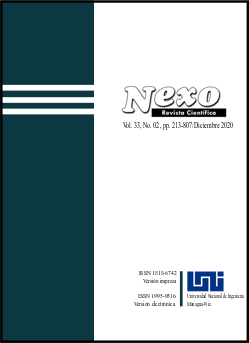Thermal design of a shell-and-tube heat exchanger for methanol cooling
DOI:
https://doi.org/10.5377/nexo.v33i02.10807Keywords:
Cost, Design, Evaluation, Shell-and-tube heat exchangerAbstract
The heat transfer between fluids is an essential part of most chemical processes. In this work the thermal design of a shell-and-tube heat exchanger was carried out to cool a methanol stream from 60 to 30 °C, using water at 5 °C as a cooling agent. The designed equipment will have a shell diameter of 0.39 m, a tube pitch of 0.0254 m, a baffle number of 26, a baffle spacing of 0.186 m, a number of tubes of 124, a surface over design (OS) of 26.25% and a calculated length (LC) of 3.71 m. The calculated pressure drops were 3,972.93 Pa and 3,099.59 Pa for water and methanol, respectively. The designed shell and tube heat exchanger is suitable for the service required, since the OS does not exceed 40%; it is true that Lc < LT; and the calculated values of the pressure drops are not greater than the maximum allowable pressure drop for both streams. Finally, the designed equipment will have a preliminary cost of USD $ 41,800.
Downloads
Downloads
Published
How to Cite
Issue
Section
License
Copyright (c) 2021 Array

This work is licensed under a Creative Commons Attribution 4.0 International License.
The authors who publish in Nexo Scientific Journal agree to the following terms:
- Authors retain the copyright and grant the journal the right of the first publication under the license Creative Commons Attribution License https://creativecommons.org/licenses/by/3.0/, which allows others to share the work with a recognition of the authorship of the work and the initial publication in Nexo Scientific Journal.
- Authors may separately establish additional agreements for the non-exclusive distribution of the version of the work published in the journal (for example, in an institutional repository or a book), with the recognition of the initial publication in Nexo Scientific Journal.
- Authors are allowed and encouraged to disseminate their works electronically (for example, in institutional repositories or in their own website) before and during the submission process, as it can lead to productive exchanges, as well as earlier and greater citation of published works.











